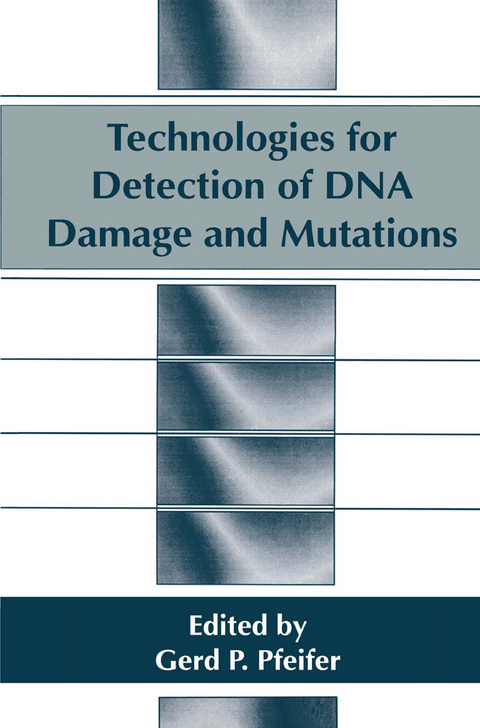
Technologies for Detection of DNA Damage and Mutations
Springer-Verlag New York Inc.
978-1-4899-0303-7 (ISBN)
I. Technologies for Detection of DNA Damage.- 1. Microgel Electrophoresis of DNA from Individual Cells: Principles and Methodology.- 2. The Cytokinesis-Block Micronucleus Technique.- 3. Agarose Gel Electrophoresis for DNA Damage Analysis.- 4. 32P-Postlabeling for Detection of DNA Adducts.- 5. A Postlabeling Assay for Oxidative Damage.- 6. Radioimmunoassay of DNA Damaged by Ultraviolet Light.- 7. Monoclonal Antibody-Based Quantification and Repair Analysis of Specific Alkylation Products in DNA.- 8. Detection of Oxidative DNA Base Damages: Immunochemical and Electrochemical Approaches.- 9. Strategies for Measuring Damage and Repair in Gene-Sized Specific DNA Sequences.- 10. Methods to Measure the Repair of Genes.- 11. Mapping and Quantification of Bulky Chemical-Induced DNA Damage Using UvrABC Nucleases.- 12. The Use of DNA Glycosylases to Detect DNA Damage.- 13. PCR-Based Assays for the Detection and Quantitation of DNA Damage and Repair.- 14. DNA Damage Analysis Using an Automated DNA Sequencer.- 15. Ligation-Mediated PCR for Analysis of UV Damage.- 16. Ligation-Mediated PCR for Analysis of Oxidative DNA Damage.- 17. Single-Strand Ligation PCR for Detection of DNA Adducts.- II. Technologies for Detection of Mutations.- 18. Heteroduplex Analysis.- 19. Mutation Analysis by Denaturing Gradient Gel Electrophoresis (DGGE).- 20. Constant Denaturant Gel Electrophoresis (CDGE) in Mutation Screening.- 21. Single-Strand Conformation Polymorphism Analysis.- 22. Two-Dimensional Gene Scanning.- 23. Ligase Chain Reaction for the Detection of Specific DNA Sequences and Point Mutations.- 24. The Protein Truncation Test (PTT) for Rapid Detection of Translation-Terminating Mutations.- 25. Single Nucleotide Primer Extension for Analysis of Sequence Variants.- 26. Sequencing of PCR Products.- III. Mammalian Systems for Mutation Analysis.- 27. Detection and Characterization of Mutations in Mammalian Cells with the pSP189 Shuttle Vector System.- 28. The HPRT Gene as a Model System for Mutation Analysis.- 29. Bacteriophage Lambda and Plasmid lacZ Transgenic Mice for Studying Mutations in Vivo.- 30. The Use of lacI Transgenic Mice in Genetic Toxicology.- 31. Genotypic Mutation Assay (RFLP/PCR).
| Zusatzinfo | XXVI, 441 p. |
|---|---|
| Verlagsort | New York |
| Sprache | englisch |
| Maße | 155 x 235 mm |
| Themenwelt | Studium ► 2. Studienabschnitt (Klinik) ► Humangenetik |
| Naturwissenschaften ► Biologie ► Biochemie | |
| Naturwissenschaften ► Biologie ► Botanik | |
| Naturwissenschaften ► Biologie ► Zoologie | |
| Technik ► Umwelttechnik / Biotechnologie | |
| ISBN-10 | 1-4899-0303-8 / 1489903038 |
| ISBN-13 | 978-1-4899-0303-7 / 9781489903037 |
| Zustand | Neuware |
| Informationen gemäß Produktsicherheitsverordnung (GPSR) | |
| Haben Sie eine Frage zum Produkt? |
aus dem Bereich


